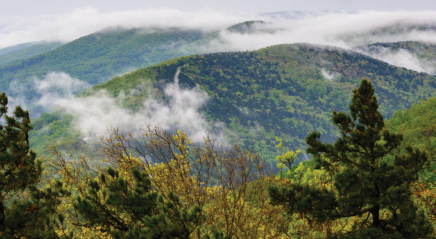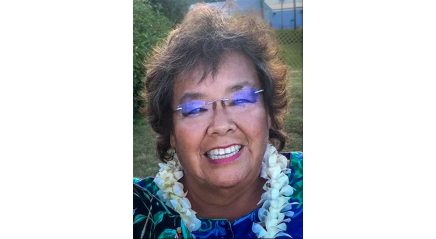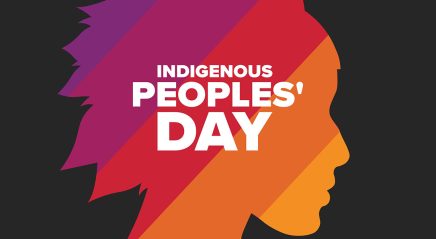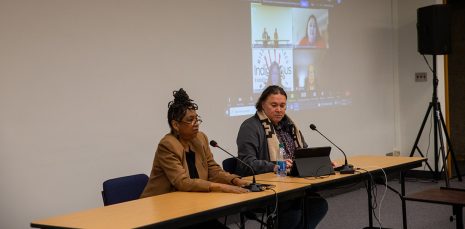Vine Deloria Jr., who died in 2005, was many things: a historian, a theologian, a political activist and an author whose 1969 book Custer Died for Your Sins: An Indian Manifesto became a defining text of the American Indian Movement. But for Aaron Payment, who met Deloria in 1988 as a graduate student and spoke in November at the symposium now named for him, Deloria was, above all, a provocateur.
Payment remembered a 1991 commencement dinner at Northern Michigan University where Deloria was being honored. “At the dinner they gave him these little medals, the campus medals with the logo and everything,” Payment said. In response, Deloria cracked, “Not since we signed our treaties have we had such an honor!”
Other speakers at the Vine Deloria Jr. Theological Symposium, held Nov. 13-15 online and at the Lutheran School of Theology at Chicago (LSTC), expressed esteem for the Native American scholar, and the symposium’s focus on tribal sovereignty was highly appropriate given Deloria’s strong belief in Native self-determination. As the speakers made clear, sovereignty is a bedrock issue for Native Americans, and many social and political problems currently plaguing them come down to the question of whether Native nations can decide matters for themselves and see their decisions honored by other powers.
Stacy Leeds, dean of the Sandra Day O’Connor College of Law at Arizona State University, delivered the symposium lecture, a chronology of seven U.S. Supreme Court cases from 1838 to 2021 that laid bare the legal complexities facing a supposedly sovereign nation in the United States as it tries to coexist with both the federal government and various state governments.
Cherokee Nation v. Georgia, the first Supreme Court case brought by an Indian tribe, illustrates how little protection the U.S. Constitution had to offer Indigenous peoples. The state of Georgia wanted jurisdiction of Cherokee lands inside its state lines, but the Cherokees pointed to their long history of international treaties with Great Britain and the newly independent United States.
“The Cherokee Nation’s position is, they have a well-established and well-bargained-for geographic and territorial nation that is to be respected,” Leeds explained, “and that, if push comes to shove, the United States is duty-bound to protect that territorial sovereignty. … [Georgia’s] reading of the United States Constitution is that its rights will always trump the United States’ rights unless the U.S. Constitution has said otherwise.”
“As long as we define sovereignty inside the U.S., we are still colonizing ourselves.”
Ultimately both arguments were moot: the court ruled that because the Cherokees were neither an individual, a state or, geographically, a foreign power, they could not qualify as plaintiffs before the court and therefore could not bring a case. “Think about that for a second,” Leeds said. “You are a nation that has bargained for territorial integrity and respect on an international level, and certainly with the United States, but that becomes a right without a remedy because the courts that would help you out are saying, ‘We can’t hear your case because you aren’t an appropriate plaintiff.’”
Bob Talton, a citizen of the Cherokee Nation, was an individual and did petition the Supreme Court, in 1896, after being convicted of murder and sentenced to death by a Cherokee court. “His argument is that the Cherokee Nation has violated his constitutional rights under the U.S. Constitution, because the U.S. Constitution must apply everywhere physically in the United States,” Leeds said.
In Talton v. Mayes, she explained, the court acknowledged the Cherokees’ sovereignty. “They ruled that tribal governments, in the exercise of their own power, are governments that are ruled by their own laws, and that they are [not] inside the United States conceptually, because they were never part of the constitutional process and … their sovereignty was inherent long before there was a United States of America.”
Leeds continued with several cases from the 1970s whose relevance has hardly diminished since then. In Oliphant v. Suquamish Indian Tribe, a non-Indian convicted of assaulting a tribal police officer on a reservation argued that the court had no jurisdiction, and the Supreme Court agreed. “I can’t think of a case in the last 150 years that had more profound impact for the ability to keep people safe on a reservation or within Indian country,” Leeds declared. The case, she said, “created this epidemic of domestic violence against Native women inside of Indian country because the perpetrators knew that the tribal police and the tribal courts couldn’t do anything to them.” The current crisis of murdered and missing Indigenous people, she asserted, has its roots in this decision.
The following evening the symposium’s emphasis shifted at the panel discussion, facilitated by by Vance Blackfox, interim senior director of ministry of diverse cultures and communities and director of Indigenous Ministries and Tribal Relations, as Leeds’ careful legal parsing of tribal sovereignty gave way to calls for advocacy. It also widened the scope of discussion beyond the parameters of the U.S. Constitution, with Payment, who is vice president for tribal relations and learning for Kauffman and Associates Inc., arguing that Native nations should once again see themselves as international players: “As long as we define sovereignty inside the U.S., we are still colonizing ourselves.”
“[There are] so many Christian Native folks who have led with their calling and witness, who’ve lived out what Christ has called us to do in an authentic way. And I believe that Jesus Christ came for all people.”
Payment was joined on the panel by Fawn Sharp, just wrapping up her duties as 23rd president of the National Congress of American Indians. Sharp defined sovereignty in stark practical terms, hailing the work of her own Quinault Indian Nation in Taholah, Wash., during the chaotic early days of the COVID-19 pandemic. In the absence of any coherent federal response, the tribe looked to its own sovereign powers to meet the crisis.
As Sharp explained, the Quinault based their efforts on the World Health Organization’s model of baseline testing, surveillance testing and immediate containment of the infected. Tribal law empowered them to license testing of staff and citizens on the reservation, so they engaged the University of Washington to conduct testing and, within two weeks, opened a pop-up clinic on the reservation. “Within a month,” she said, “we had about 30 percent of our citizens tested, when Governor Cuomo in New York was touting 10 percent.”
As the pandemic progressed, the Quinault turned a hotel on the reservation into a quarantine center that ultimately served not only the tribe but the entire county. “Across Indian country,” Sharp said, “during a pandemic when we had little to no resources, when we were the most vulnerable [due to poor health and inadequate health care], tribal nations were exercising sovereignty, doing what they know how to do, to protect our citizens.”
Sponsored by LSTC’s Pero Center for Intersectionality Studies, ELCA Indigenous Ministries & Tribal Relations and Other+Wise, the symposium included two chapel services where Blackfox and David Wilson, bishop of the Great Plains Conference of the United Methodist Church, brought an Indigenous theological perspective to tribal sovereignty and to Vine Deloria Jr., who was harshly critical of Christian churches in the U.S. Blackfox, who coordinated the symposium, defined sovereignty in spiritual terms, calling it “not a gift from anyone. Because of our very existence, because the Creator has brought us to this place, Mother Earth, we are sovereign on our own.”
Wilson noted that Deloria had urged Native people to abandon Christianity and return to Indian religions, which were already rooted in the principle of mutual sharing that animates Christ’s message. The bishop explained that, when people challenge him to reconcile his Choctaw heritage with his membership in a religion that oppressed his people, he tells them, “My experience with Christianity has been one that has fulfilled my life and calling. [There are] so many Christian Native folks who have led with their calling and witness, who’ve lived out what Christ has called us to do in an authentic way. And I believe that Jesus Christ came for all people.”
Yet, Wilson also cited Red Jacket, the great Seneca orator whose 1805 speech “Religion for the White Man or the Red” rejected the notion of Christian settlers that Native people should adopt the one true religion. If this book is so good, Red Jacket asked, why hadn’t the Great Spirit given it to his ancestors? Why was it arriving only now, in the hands of white men with dreams of conquest? His story reminds us that, in this life, sovereignty includes the right to decide one’s own faith and that, in the next, there’s only one sovereign power.








